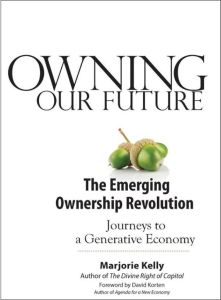
Owning Our Future
The Emerging Ownership Revolution
Recommendation
Organizations have different values and viewpoints. Some are “extractive,” which means they drain the maximum financial value out of their coffers at all costs. Ownership strategy specialist Marjorie Kelly contends that the extractive nature of capitalism led to the 2008 recession because “financialized ownership” pushed the economic system beyond its tolerance. Some organizations, in contrast, are “generative” and base their structure on “sustainability, community and sufficiency.” Kelly’s impassioned arguments in favor of a generative, sustaining economy could strike some readers as pie in the sky, though she offers numerous real-life examples of global businesses pioneering fresh approaches to ownership. While never advocating any particular political point of view, getAbstract recommends her informed treatise to those pondering the economic future.
Summary
About the Author
Marjorie Kelly is a fellow at the Boston-based Tellus Institute and the director of ownership strategy at the consultancy Cutting Edge Capital.







Comment on this summary